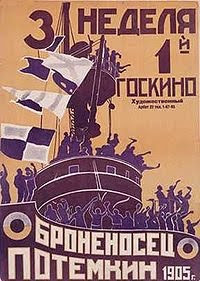Selected papers from a conference sponsored by Zentrum für Interdisziplinäre Forschung, University of Bielefeld held in 1979.
Cover of book shows "Jacket illustration of Battleship Potemkin poster from the National Film Archive, London" of a sailor with the ship's name on the headband of his cap.
The book contains papers on:
1. Introduction: Feature films as history
2. Battleship Potemkin
3. Germany and France in 1920s
4. Jean Renoir
5. British films, 1935-1947
6. Film censorship in Liberal England
7. Casablanca, Tennessee Johnson and The Negro Soldier
8. Hollywood fights anti-Semitism
Showing posts with label USSR. Show all posts
Showing posts with label USSR. Show all posts
Thursday, January 14, 2010
Tuesday, February 10, 2009
New Reagan book
 The Rebellion of Ronald Reagan: A History of the End of the Cold War.Mann, James (author).
The Rebellion of Ronald Reagan: A History of the End of the Cold War.Mann, James (author).Mar. 2009. 379p. Viking, hardcover, $27.95
Review: Lucky or resolute? Mann has reset the terms for the debate between Reagan’s liberal detractors and his conservative admirers. In this surprising history of how Reagan helped unravel the Soviet Empire, Mann adduces convincing evidence that the fortieth president deserves far more credit for ending the Cold War than his liberal critics have given him. However, that same evidence—drawn from probing interviews and newly available archives—smashes the standard conservative account of Reagan’s triumph. As it turns out, the great conservative icon of the 1980s toppled Soviet communism by ignoring bellicose rhetoric of the sort he himself had used to galvanize opposition to the Evil Empire. Defying his ideological advisors—including Nixon, Kissinger, and Buckley—Reagan reshaped the world by boldly reaching out to Mikhail Gorbachev in face-to-face negotiations on arms control. Mann persuasively shows that even when Reagan overruled moderates (such as Baker and Powell) who objected to his speech demanding that Gorbachev tear down the Berlin Wall, he was engaging his Kremlin counterpart in a dance of rapprochement. A sharp challenge to theories that discount the decisive role of personalities in global affairs, Mann’s insightful portrait of Reagan reveals an adept statesman who concealed a calculating shrewdness behind a deceptively folksy demeanor. — Bryce Christensen
Subscribe to:
Posts (Atom)
